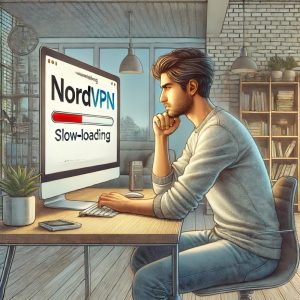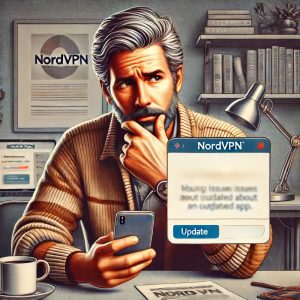NordVPN Slow
In the digital world, Virtual Private Networks (VPNs) have become important tools for enhancing online privacy and security. As users worldwide turn to VPNs to shield their internet activities from prying eyes, the performance and speed of these services are of utmost importance. NordVPN, recognized as one of the leading VPN providers, offers robust security features. However, a common concern among its users is that sometimes NordVPN is slow, which can hinder the seamless digital experience that users expect.

This slowdown can be particularly noticeable when NordVPN slows down the internet, affecting everything from browsing speed to streaming quality. Given the importance of a swift and steady connection, understanding the reasons behind the slow speed of NordVPN is crucial. In this blog, we will deeply look into the factors that might cause such performance dips, from server load and location to more technical aspects such as encryption strength and configuration settings.
NordVPN very slow connections can be a significant impediment, especially for those who rely on fast internet for work or leisure, like streaming or gaming. It’s important to note that while NordVPN promises high-speed internet and privacy, various external and internal factors can influence the true speed you experience. This blog aims to explore these factors and provide practical solutions and troubleshooting steps to help you optimize your connection speed.
Additionally, for users experiencing consistent issues where NordVPN slows down internet access, we will cover advanced tips and tweaks that could enhance your browsing and streaming speeds. Whether you’re a casual user facing occasional slowdowns or someone plagued by persistent speed issues, this comprehensive blog will offer insights and solutions to improve your NordVPN experience.
Common Reasons for the Slowness of NordVPN
Experiencing the slow connection of NordVPN can be frustrating, especially when you depend on your internet for timely tasks and entertainment. There are several factors that can contribute to the slowness of NordVPN, ranging from server selection to the type of device you are using. Understanding these can help mitigate the problem and lead to a smoother VPN experience.
-
NordVPN Server Location:
It is a primary factor affecting VPN speeds. The further the data has to travel to and from the server, the longer it takes. This latency can be particularly noticeable if the server is continents away. When NordVPN slows down internet speed due to server distance, switching to a server closer to your actual location might reduce latency significantly and improve your connection speed.

-
NordVPN Server Load:
It also plays a crucial role. If too many users connect to the same server, the increased traffic can lead to congestion, resulting in the slow speed of NordVPN. NordVPN usually suggests servers with the lightest load within the app, which can be a great way to avoid this issue.
-
ISP Throttling:
It is another common culprit behind slow VPN speeds. Some ISPs may purposely slow down your internet when they detect heavy data usage, including streaming or large downloads, particularly through VPNs. This can make NordVPN slow to connect or even disrupt your connection stability. Using a different protocol or server might help circumvent throttling.
-
NordVPN Encryption Level:
The encryption Level that NordVPN uses to secure your data also affects your internet speed. Higher encryption means better security but can also lead to a really slow experience of NordVPN. It provides options to choose between different encryption settings, allowing users to strike a balance between security and speed.
-
Outdated NordVPN App:
An outdated NordVPN App can also cause connectivity issues. Frequent updates not only bring advanced features and security patches but also optimizations that might fix bugs slowing down your connection. Ensuring that your NordVPN app is up-to-date is an essential step in maintaining optimal performance.
-
Incompatible NordVPN Network Settings:
Network Settings can interfere with how well NordVPN functions. For example, if your firewall settings are too restrictive, they might block some of the VPN traffic, leading to NordVPN slowing down the internet. Adjusting these settings to be more compatible with NordVPN can often resolve speed issues.
-
Device Limitations:
Lastly, device Limitations might be at play. Older devices with limited processing power struggle more with high-level encryption, which is necessary for VPNs to secure your data. This can cause a noticeable decrease in speed when using NordVPN. Upgrading your device or adjusting the encryption level might help alleviate this issue.
Addressing these factors can significantly improve the slow connection of NordVPN and enhance your overall online experience, making sure that NordVPN slows down the internet less frequently and allowing you to enjoy the full benefits of your VPN service.
How to Test Your NordVPN Speed
When you suspect that your NordVPN download speed is slow is not what it should be, conducting a thorough speed test is a crucial diagnostic step. This process can help you understand whether the problem is with the VPN, your local network, or your internet service provider.

Tools and Methods to test NordVPN Speed
There are several reliable tools available specifically designed to test VPN speeds. These tools measure various aspects of your internet connection, including download and upload speeds, delays and sometimes even packet loss.
- For testing NordVPN slow download speed, using tools like Speedtest by Ookla, Fast.com, or other services that offer detailed insights can be particularly helpful. When running these tests, ensure that your VPN is active to measure the speed while connected to NordVPN.
- Another method is to use the built-in speed test feature that some VPN providers offer. For instance, NordVPN provides a server speed test tool in its apps that can help you identify which servers are performing the best at any given time. This is useful for finding a faster connection if you’re experiencing NordVPN slow performance issues.
Baseline Performance
- To accurately determine if NordVPN slow performance is due to the VPN or other factors, it’s essential to establish a baseline performance. This means testing your internet speed without the VPN activated. Conduct the same speed test on the same network without VPN connectivity to get a clear picture of what your raw internet speeds are like.
- Once you have the baseline, reconnect to NordVPN and perform the speed test again using the same server you used for the non-VPN test. Comparing these results will help you determine if the drop in speed is within acceptable ranges, or if it points to a specific issue of slow download speed of NordVPN.
- For instance, it’s normal to see some speed reduction when using a VPN, due to encryption overhead and the additional distance data must travel. However, if the difference is significant, it could indicate a problem with server overload, your ISP throttling VPN connections, or incorrect network settings.
Regularly testing your VPN speed is a good practice to ensure that you are getting the best possible performance from your VPN service. This approach not only helps to confirm whether NordVPN slow download issues are an anomaly or a consistent problem but also guides you in troubleshooting steps or in deciding if you need to switch to a different server or adjust your VPN settings.
Troubleshooting Steps to Increase NordVPN Speed
If you’re experiencing issues where NordVPN makes internet slow or you find that NordVPN is slow despite your high-speed internet connection, there are several troubleshooting steps you can take to potentially increase the speed. Here are some effective strategies to help you optimize your NordVPN connection and alleviate problems related to NordVPN slowing down internet speeds.

Switching NordVPN Servers
One of the most common reasons for NordVPN slow internet speed is the server you are connected to. If too many users are on the same server or if the server is geographically distant, you may experience lag. NordVPN provides a large selection of servers around the globe, so switching to a different server can often resolve speed issues.
When selecting a server, consider both the server load and its proximity to your location. A server closer to you with a lower load is ideal. NordVPN apps typically show the current load percentage of each server, making it easy to choose one with less traffic. This can significantly reduce instances where NordVPN slowing down internet becomes noticeable.
Changing NordVPN Protocols
NordVPN supports various protocols, each offering different advantages in terms of speed and security. The main protocols available are:
-
IKEv2:
Fast and secure, ideal for mobile devices that switch between Wi-Fi and cellular data.
-
OpenVPN:
Offers solid security and can be faster on stable, high-speed connections.
-
NordLynx:
Based on WireGuard technology, it offers the best combination of speed and security.
If NordVPN is slow, experimenting with these protocols can help. NordLynx, in particular, is known for its superior performance and might solve issues related to NordVPN making internet slow.
Adjusting NordVPN Security Settings
While VPNs enhance security by encrypting data, higher encryption levels can impact internet speed. If you’re facing slow issues with NordVPN, adjusting the encryption strength may help improve speed. Lowering encryption can potentially increase speed, but it’s important to find a balance that does not compromise your security.
Configuring NordVPN Network Settings
Improper network settings can also contribute to slow internet speeds. Here are a few adjustments that can help optimize VPN performance:
-
Disable IPv6:
This is often not supported by VPNs and can cause leaks and slow connections.
-
Change DNS servers:
Switching to NordVPN’s DNS servers or another fast, secure DNS provider can improve response times.
-
Adjust firewall and antivirus settings:
Sometimes, these can interfere with VPN connections. Configuring them to allow VPN traffic can resolve speed issues.
By following these instructions, you can effectively look into the problems related to NordVPN slowing down internet speeds. Regularly reviewing and adjusting these settings according to your specific usage and network conditions can help maintain optimal VPN performance, ensuring that slowness of NordVPN becomes a less frequent issue for you.
Advanced Tips for Enhancing NordVPN Speeds
For users grappling with issues such as NordVPN slow on Firestick, on Windows 10, or generally extreme slow performance, advanced techniques can be applied to enhance your VPN speeds. These strategies are particularly useful for situations where typical troubleshooting has not adequately resolved slow NordVPN issues.

Using Wired Connections
A significant boost in VPN performance can often be achieved by switching from a Wi-Fi connection to a wired Ethernet connection. Wi-Fi can be susceptible to interference and typically offers less stability and speed compared to a wired connection. This is particularly relevant when NordVPN is slow on devices that support Ethernet, such as desktop computers or laptops. Ethernet connections provide a more consistent data flow, which is less likely to be affected by distance from the router, walls, or other obstacles that typically affect wireless signals. If you still face issues with connectivity, you can read our detailed blog on NordVPN is Not Connecting and get the solution for it.
Optimizing Device Performance
Another effective strategy for dealing with NordVPN slowing internet is to ensure that your device is running optimally. This can be particularly helpful if your VPN is extremely slow. Closing unwanted applications can free up system resources, which might be constrained on your device, leading to improved VPN performance. Additionally, clearing your device’s cache can also help speed things up by removing temporary files that can bog down processing power.
When NordVPN slow speed is an issue, it’s also worthwhile to perform regular system maintenance tasks such as disk cleanup and defragmentation (for HDDs), or ensuring your operating system and drivers are up to date. These steps help in maintaining the overall health of your device, providing a more stable environment for the VPN to operate.
Router Settings Adjustments
For those experiencing NordVPN slow on Firestick or any device connected to a home network, adjusting your router settings can make a great difference. Some key tweaks include:
-
Enabling Quality of Service (QoS):
This setting allows you to prioritize VPN traffic over other types of traffic on the network, which can help maintain speed during high-usage periods.
-
NordVPN Passthrough and Port Forwarding:
Enabling these features can help improve VPN performance and connectivity. They ensure that VPN traffic is not blocked or slowed by your router.
-
Updating Firmware:
Keeping your router’s firmware updated can resolve potential bugs that might be impacting performance. Manufacturers often release updates that improve device compatibility and performance.
Implementing these advanced tips can greatly alleviate problems with NordVPN slowing internet, especially in cases where the VPN is extremely slow. By ensuring both your hardware setup and software environment are optimized, you can enjoy faster and more reliable VPN speeds, making the experience smoother whether you’re streaming, gaming, or just browsing.
FAQs
Q. Why is my NordVPN connection so slow?
- A. If you’re experiencing a very slow connection of NordVPN, it might be due to server distance, high server load, or your ISP throttling VPN traffic. Try switching to a closer server with less load for improved speed.
Q. What can I do if NordVPN slows down my internet speed?
- A. You can enhance your slow internet speed by changing VPN protocols to NordLynx for optimal performance, and ensuring your VPN app and device are up to date.
Q. How does server location affect NordVPN slow issues?
- A. Server location can significantly impact your VPN speed because data has to travel longer distances. Choosing a server closer to your physical location can reduce latency and speed up your connection.
Q. Can NordVPN slow to connect issues be resolved by switching servers?
- A. Yes, switching to a less crowded server or one that is geographically closer can often resolve issues where NordVPN is slow to connect and improve overall speed.
Q. What are the best NordVPN settings to fix a NordVPN slow download?
- A. For NordVPN slow download speed, optimize your settings by selecting the NordLynx protocol, and checking if your firewall or network settings are not restricting VPN traffic.
Q. How do I handle NordVPN making internet slow on my Firestick or Windows 10?
- A. If NordVPN is slow on Firestick or on Windows 10, try connecting to a server with lower latency and fewer users, and ensure your device’s operating system is fully updated.
Q. Why does my VPN speed test show NordVPN download speed slow as compared to non-VPN speeds?
- A. A VPN encrypts your traffic, which can reduce speed. If you notice a significant drop, consider testing different servers or adjusting your encryption level to see if it improves your slow internet speed.
Q. What should I do if NordVPN slows down internet speed even after changing servers?
- A. If changing servers doesn’t help when NordVPN slows down internet speed, try tweaking your encryption settings.
Q. How can outdated apps influence NordVPN slow connection?
- A. An outdated NordVPN app may lack the latest optimizations and bug fixes that enhance performance and stability, contributing to slow connection issues. Regularly updating the app can provide noticeable improvements.
Q. What advanced router settings should I adjust if NordVPN is very slow?
- A. To address an extremely slow connection of NordVPN, enable VPN passthrough on your router, update its firmware, and consider enabling Quality of Service (QoS) to prioritize VPN traffic, which can significantly improve speed.
Conclusion
In this blog, we’ve delved into various reasons why NordVPN is slow, including server distance, high server load, outdated software, and more. These factors can often lead to NordVPN very slow connection issues or general slow speed problems. By choosing servers that are geographically closer and less crowded, you can enhance your VPN speed significantly. Moreover, switching between different protocols such as IKEv2, OpenVPN, and NordLynx, according to your specific needs, can give an optimal balance between security and speed, which is particularly beneficial if you’re experiencing NordVPN slowing down internet.
Optimizing both your device and router settings is crucial. Using wired connections rather than Wi-Fi, closing unnecessary apps, and tweaking your router settings to prioritize VPN traffic can all help to address issues where NordVPN is slowing down the internet. In addition, keeping your software and firmware up to date is essential for maintaining performance and security, thereby avoiding persistent NordVPN slow issues.
Given the variability in individual network conditions and personal usage requirements, we encourage you to experiment with different settings. Finding the right server, adjusting encryption levels, and configuring network preferences can make a significant difference in your VPN’s performance. By actively managing these settings, you can find a configuration that not only secures your online activity but also optimizes your overall internet speed. Achieving the best performance with NordVPN means continuously balancing security, speed, and reliability to suit your specific needs.
To know more about NordVPN Slowness and other related issues and solutions, visit our NordVPN Support Page.
